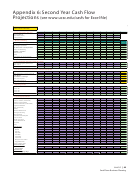Small Farm Business Planning Templates And Instrucitons Page 6
ADVERTISEMENT
B. The Business Planning Process and the Written Business Plan
1. The process of business planning is to think methodically about all aspects of building a new
business, including: determining the compatibility of farming professionally with personal
values and goals; analysis of personal resources (e.g., skills, funding, and support network);
market analysis and market planning; financial analysis; farming/production plan to match
known market and marketing plan; and time management planning (see below for further
details)
2. To be successful in any business, business planning is essential
3. The form that business planning takes is less important than it contain all of the elements
listed above and makes sense to you. It does not have to be formal.
4. In contrast to the larger process of business planning, a written “business plan” usually means a
formal document designed to be presented to potential investors, lenders, or other stakeholders
in the enterprise
5. Making a formal business plan for outside investors is probably not an early priority
6. If the off-the-shelf business planning software packages and “How to write a business plan”
guides help guide you through the process, use them
7. Caution: Don’t let a slick format in an easy-to-use software package fool you into thinking
you have done the proper research and analysis if you haven’t (see below for the essential
elements of a business plan)
C. Critical Elements of a Business Plan for the Start–up Phase of a Small Farm Enterprise
1. Vision, values, and goals
a. Self-evaluation, determination of personal values and goals, and their compatibility
with farming as a profession/occupation – This is a separate exercise, not covered in this
class, but everything depends on it. (For resources on self evaluation and developing a
personal and business vision, see Building a Sustainable Business: A Guide to Developing a
Business Plan for Farms and Rural Businesses. Co-published by the Minnesota Institute for
Sustainable Agriculture and the Sustainable Agriculture Network, in Resources.)
b. The specific vision, values, and goals for the business will be the similar but different in
that they support your personal vision, values, and goals.
2. Resource analysis
a. Resource analysis – An evaluation of the total personal resources available to apply
toward the development and maintenance of the farming business
b. Skills assessment – Identify the skills you have that will benefit the business (e.g.,
farming skills, accounting, marketing, etc.)
c. Identify personal advisors
i. They do not need to be experts, they just need to know you well
ii. The role of the advisors may include the following –
· Help you set and meet business planning goals
· Make you justify your business decisions
· Their role is NOT to provide free ad-hoc advice regarding matters they know
nothing about
d. Time allocation – Time is a major constraint and needs to be budgeted as carefully as
money
e. Since you can’t borrow time, you actually need to budget time more carefully than money
f. Constraints – Identify the major resource constraints, e.g., time, money, access to land,
farming experience, business skills, etc.
6 | Unit 2.0
Small Farm Business Planning
Lecture 1 Outline
ADVERTISEMENT
0 votes
Related Articles
Related forms
Related Categories
Parent category: Business
 1
1 2
2 3
3 4
4 5
5 6
6 7
7 8
8 9
9 10
10 11
11 12
12 13
13 14
14 15
15 16
16 17
17 18
18 19
19 20
20 21
21 22
22 23
23 24
24 25
25 26
26 27
27 28
28 29
29 30
30 31
31 32
32 33
33 34
34 35
35 36
36 37
37 38
38 39
39 40
40 41
41 42
42 43
43 44
44 45
45 46
46 47
47 48
48 49
49 50
50








